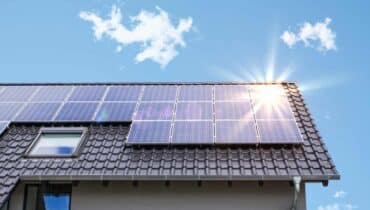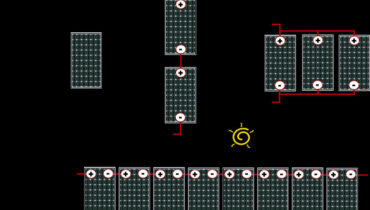Table of Contents
In the era of sustainable energy, the spotlight is on solar power, and the choice of solar panels has never been more critical. Tesla, a name synonymous with innovation, has entered the solar panel market, challenging established players. This article delves deep into the world of solar panels, pitting Tesla’s offerings against those of other reputable manufacturers.
As you navigate the path to cleaner, more affordable energy, this guide will serve as your compass. We’ll explore efficiency, aesthetics, costs, integration, and more, ensuring you make an informed decision that aligns with your unique needs and values. Join us on this journey towards a greener future.
The Importance of Solar Panels
The importance of solar panels extends far beyond their ability to convert sunlight into electricity. Solar panels are pivotal in reducing our dependency on finite fossil fuels, thereby mitigating environmental impact. They play a vital role in curbing greenhouse gas emissions, contributing to a more sustainable and cleaner energy landscape.
Solar panels also provide the advantage of cost savings, enabling homeowners and businesses to lower their electricity bills over time. Their installation can increase property values and serve as a tangible investment in a greener and more economically viable future.
Tesla Solar Panels: A Closer Look
A closer look at Tesla solar panels reveals a commitment to innovation and sustainability, consistent with Tesla’s brand reputation. These panels are designed to seamlessly integrate with existing roofs, enhancing the aesthetic appeal of homes. High-efficiency monocrystalline solar cells power Tesla panels, ensuring improved energy production.
Tesla’s Powerwall battery, capable of storing excess energy, further enhances energy independence. Additionally, the integration with Tesla’s broader energy ecosystem sets Tesla solar panels apart.
Tesla’s Commitment to Innovation
Tesla, known for its electric vehicles and innovative technology, has ventured into the solar panel market. They offer a range of solar products, including solar panels and solar roof tiles. Tesla’s reputation for innovation and sustainability attracts many consumers.
Tesla Solar Panel Features
Tesla solar panels are aesthetically pleasing, blending seamlessly into roofs. They use high-efficiency monocrystalline solar cells, offering improved energy production. Moreover, Tesla’s Powerwall battery allows you to store excess energy for use during the night or on cloudy days, enhancing energy independence.
Integration with Tesla Energy Ecosystem
Tesla’s solar panels offer seamless integration with the broader Tesla Energy Ecosystem, creating a comprehensive and interconnected approach to sustainable energy solutions. This integration extends beyond just solar panels and includes Tesla’s Powerwall battery, EV charging solutions, and other Tesla products.
Here’s how this integration works:
- Tesla Powerwall: The Powerwall allows you to store excess energy generated by your Tesla solar panels. This stored energy can be used during the night or on cloudy days, increasing your energy independence and reducing reliance on the grid.
- EV Charging: Tesla’s EV charging solutions, such as Tesla Wall Connectors, can be integrated with your solar panel system. This enables you to charge your Tesla electric vehicle with clean, solar-generated energy.
- Energy Management: Tesla’s energy management systems allow you to monitor and control your energy usage, providing insights into when and how you use energy in your home.
- Grid Connectivity: Tesla’s systems can also be configured to connect with the electrical grid, enabling you to sell excess energy back to the grid, potentially providing additional cost savings.
The integration with the Tesla Energy Ecosystem is a significant selling point for those who want a holistic and technologically advanced approach to their energy needs. It offers greater control, efficiency, and a comprehensive solution for sustainable energy production, storage, and consumption.
Top 5 Differences between Tesla solar panels and other Leading Solar Panel
Here are the top 5 differences between Tesla solar panels and other leading solar panel providers:
1. Innovative Integration with Tesla Energy Ecosystem:
- Tesla: Tesla’s solar panels seamlessly integrate with other Tesla products, like the Powerwall battery and Tesla electric vehicles (EVs). This comprehensive ecosystem allows for energy storage and enhanced sustainability.
- Others: While other providers may offer compatibility with some energy storage solutions and EV charging, Tesla’s ecosystem offers a more cohesive and integrated approach.
2. Aesthetic Appeal:
- Tesla: Tesla’s solar panels are designed to blend seamlessly with roofs, enhancing the visual appeal of your home. They have a sleek and modern look that many homeowners find attractive.
- Others: Other solar panel providers may offer different aesthetic options, but Tesla is often praised for its aesthetics.
3. Efficiency and Performance:
- Tesla: Tesla’s solar panels use high-efficiency monocrystalline solar cells, delivering impressive performance and energy production. They are known for their reliability and longevity.
- Others: Some other providers like SunPower and LG Solar also offer high-efficiency panels, which might be more suitable for limited roof space.
4. Cost:
- Tesla: Tesla’s solar panels tend to be on the higher end of the price spectrum. While they offer premium quality, this can make them less accessible for budget-conscious homeowners.
- Others: Other solar panel providers like SunPower and LG Solar offer competitive pricing, making them more budget-friendly options for many consumers.
5. Warranty and Customer Support:
- Tesla: Tesla offers warranties on its solar panels, but the terms and conditions may vary. The company is known for its customer-focused approach, providing support and service as part of the overall package.
- Others: Leading solar panel manufacturers like SunPower and LG Solar also offer robust warranties and customer support, ensuring the longevity and reliability of their products.
It’s essential to consider these factors when making a decision about solar panels, as the best choice for you will depend on your specific needs, budget, and preferences.
Other Solar Panel Providers
- SunPower: SunPower is renowned for its high-efficiency solar panels. These panels can deliver more energy in limited space, making them a preferred choice for homeowners with constrained roof space. They also offer advanced monitoring systems and warranties.
- LG Solar: LG Solar panels are known for their durability and efficient performance. LG’s solar panels are highly efficient, making them an excellent choice for residential and commercial installations.
- Vivint Solar: Vivint Solar offers a wide range of solar solutions, including power purchase agreements and solar leases. Their approach to making solar accessible for more homeowners has gained them popularity.
Comparing Tesla Solar Panels with Others
When comparing Tesla solar panels with those from other leading providers, several factors come into play. Here’s a description of how Tesla’s offerings stack up against other solar panel manufacturers:
1. Efficiency and Performance:
- Tesla: Tesla’s solar panels are renowned for their high efficiency, largely attributed to their use of high-quality monocrystalline solar cells. This results in improved energy production and long-term reliability.
- Others: Leading competitors like SunPower and LG Solar also offer high-efficiency panels that are ideal for homeowners with limited roof space.
2. Aesthetic Appeal:
- Tesla: Tesla’s solar panels are designed with aesthetics in mind, seamlessly blending with existing roofs. They have a sleek and modern appearance that many homeowners find attractive.
- Others: While aesthetics are subjective, Tesla is often lauded for the visual appeal of its solar panels. Other providers may offer different design options but may not always match Tesla’s aesthetic integration.
3. Cost:
- Tesla: Tesla’s solar panels tend to be on the higher end of the price spectrum. They offer premium quality but may not be as budget-friendly as other options.
- Others: Companies like SunPower and LG Solar offer competitive pricing, making solar more accessible for those on a budget.
4. Integration with Energy Ecosystem:
- Tesla: Tesla’s solar panels offer seamless integration with other Tesla products like the Powerwall battery and electric vehicle (EV) charging solutions. This creates a comprehensive and interconnected energy solution.
- Others: While other manufacturers may offer compatibility with various energy storage solutions and EV charging, Tesla’s ecosystem often provides a more cohesive and well-integrated approach.
5. Warranty and Customer Support:
- Tesla: Tesla offers warranties on its solar panels, but the terms and conditions may vary. Tesla is known for its customer-focused approach, providing support and service to ensure the long-term performance of their products.
- Others: Leading solar panel manufacturers like SunPower and LG Solar also offer robust warranties and customer support, ensuring the longevity and reliability of their products.
Ultimately, the choice between Tesla solar panels and those from other manufacturers hinges on your specific requirements, budget, and priorities. Careful consideration of these factors will help you make an informed decision when selecting the right solar panel system for your home or business.
FAQs
1. What are Tesla solar panels?
Tesla solar panels are photovoltaic panels designed to convert sunlight into electricity. They are part of Tesla’s renewable energy solutions and are known for their high efficiency and sleek design.
2. How do solar panels work?
Solar panels work by harnessing the energy from sunlight and converting it into electricity. They contain solar cells that absorb photons from the sun, generating an electric current that can be used to power your home.
3. What are the benefits of installing solar panels?
The benefits of installing solar panels include reduced electricity bills, decreased reliance on fossil fuels, a lower carbon footprint, increased home value, and potential government incentives and rebates.
4. Are Tesla solar panels more efficient than those from other manufacturers?
Tesla solar panels are known for their efficiency, but the level of efficiency can vary among different manufacturers and models. It’s essential to compare efficiency ratings when choosing solar panels.
5. How long do solar panels last?
Most solar panels have a lifespan of 25 to 30 years or more. They often come with warranties that guarantee their performance for a specified period, typically around 25 years.
Conclusion
In the realm of solar panels, Tesla offers innovative and efficient solutions that cater to environmentally conscious consumers. However, it’s essential to consider various factors when choosing a solar panel provider, including efficiency, aesthetics, cost, and integration with your energy needs.
As you explore your solar panel options, remember to engage with like-minded communities and seek reliable information to make an informed decision. You can find the right solar panel solution for your home, contributing to a sustainable energy future.

